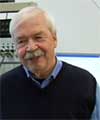
Uwe Heinemann
1944 – 2016
It is with great sadness that we announce the passing of Uwe Heinemann on September 8, 2016. This is a great loss to the community, and is deeply felt by all his friends, co-workers and colleagues.
Uwe Heinemann was one of the most outstanding and influential researchers in the field of epilepsy world-wide. He was a force in this field for almost five decades, starting with his early research with Otto Creutzfeldt on mechanisms of EEG, and his postdoctoral work at the Max Planck Institute for Psychiatry in the Department of Neurophysiology in Martinsried in the 1970s. In this time, he made uncounted seminal scientific contributions to the field, which frequently triggered new directions in epilepsy research.
Uwe was a substantial force in shaping epilepsy research on many other levels. First and foremost, he had a remarkable ability to convey his fascination with the field of epilepsy to students and young researchers. Young epilepsy researchers from Finland, Israel, France, Belgium, Holland, England, Ireland, Russia and many other Countries have been students, researchers or guests in his laboratory, and have retained epilepsy as a lifelong research interest. An unusually large number of these have gone on to obtain faculty positions at prestigious institutions. Additionally, Uwe had a remarkable committment to teaching. He was always very active in making the science behind epilepsy accessible to patients, students, neurologists and laypersons. He not only gave innumerable lectures, but also reformed or initiated numerous teaching programs, including medical studies, local and international neuroscience graduate schools and training centers.
Uwe was a member of numerous commissions and governing bodies, from within which he has given numerous impulses that have shaped the field. These included the Commission on Neurobiology and Epilepsy and the Long Term Planning Commission of the ILAE, Advisory Board for the European Academy of Epilepsy, European Epilepsy Congress, European Neuroscience Conference and the Biannual Cogress of the ILAE. He was past president of the German Epilepsy Society (1993-1995), and honorary member of the society since 2012. He was also one of the initiators of the Workshop on Neurobiology of the Epilepsies, which has gone on to become one of the most influential think tanks in epilepsy research today. The scientific excellence and integrative personality of Uwe Heinmann has been internationally recognized with numerous awards, including the international Michael Prize for Epilepsy Research (1977 and 1987), the Alfred Hauptmann Prize (1988), the Ambassador for Epilepsy Award (1989), the Basic Science AES Award (1992), and the European Epilepsy Award (2008).
Lastly, but perhaps most importantly, Uwe was beloved by many for his unfailing loyalty and supportiveness, an unstinting generosity towards colleagues and his scientific progeny. His scientific curiosity, his enthusiasm, his encyclopedic knowledge, and his honest delight in well-performed science were an example for a whole cohort of neuroscientists. Invariably, the numerous Ph.D. students, postdoctoral fellows, guests and collaborators speak fondly of their time in Uwe's laboratory, and the lifelong relationships that followed. Many of us in the field owe him much, both personally and professionally.
He will be missed by many. Uwe is survived by his wife Marianne, his daughter Daniela and his grandson Joel. Our thoughts are with them.
— Heinz Beck
The epilepsy community lost one of its leading researchers and mentors with the death of Uwe Heinemann on September 8, 2016. At the time of his death, Uwe was a Senior Professor at the Charité in Berlin where he had been a Professor of Neurophysiology and Neuroscience for the last 23 years. He was a leading and passionate researcher in epilepsy with an insatiable desire to understand its causes and the causes of drug resistance. He also studied the brain circuits that support seizures, and in those studies helped us to understand how the brain itself works. He and his colleagues developed new models of seizures and epilepsy that have been major tools to epilepsy researchers around the world.
Just as importantly, he trained several generations of scientists who have become major figures in epilepsy research in their own right. Great researchers are usually recognized for their body of work or the efforts of their students. Uwe was among the greatest because of both. We have benefitted from his work and from the work of his scientific children and grandchildren. It is quite a legacy that he has left us.
Subscribe to the ILAE Newsletter
To subscribe, please click on the button below.
Please send me information about ILAE activities and other
information of interest to the epilepsy community